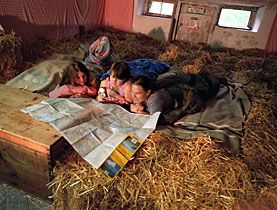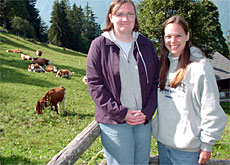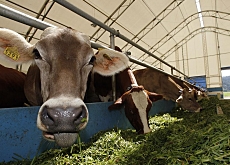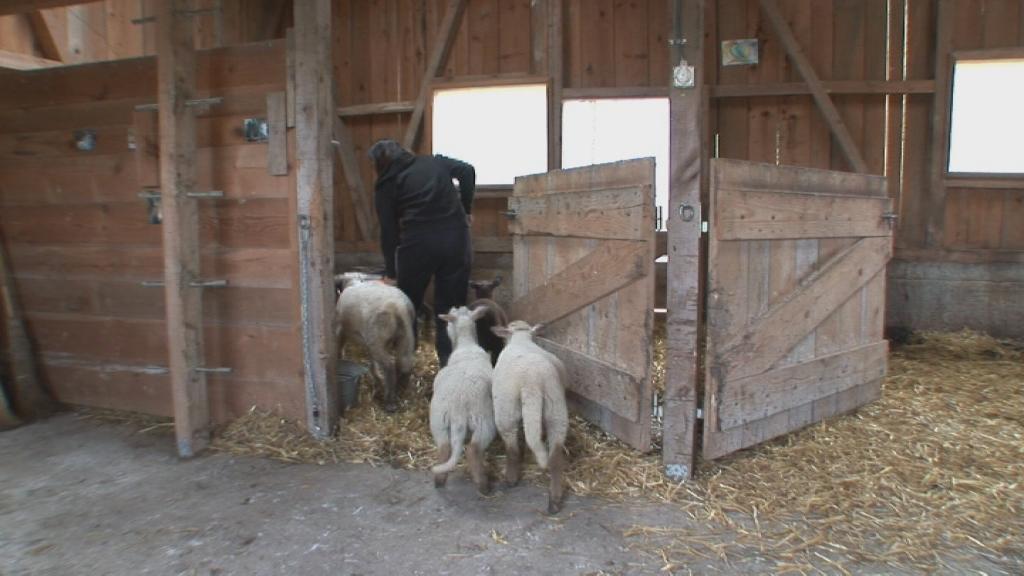Rural tourism struggles to take root

Staying on farms and experiencing rural Swiss life first-hand is a sorely underdeveloped sector of the tourism economy, a study has found.
With its pastures dotted with cows and its scenic valleys, Switzerland is an ideal country for agrotourism, yet the industry lags well behind neighbouring countries that have less to offer.
A Swiss Centre for Mountain Regions study presented on Tuesday suggested that the country could bolster its rural holiday market with focused marketing efforts, comprehensive funding and better industry standards.
If the measures take root, farmers and rural innkeepers stand to reap millions of more francs each year in income while helping to preserve the country’s celebrated open spaces.
“We have to do this,” Thomas Egger, director of the Swiss Centre for Mountain Regions, told swissinfo.
“There are many reasons. Having contact with the farmers themselves, introducing children to animals that maybe they’ve only seen on television, to rediscover nature – that is the main aspect.”
Splintered efforts
Although Swiss farmers have been enjoying robust sales recently, high production costs are eating into profits. The Federal Agriculture Office has encouraged farmers to be creative in finding ways to bolster their incomes through new activities.
Agrotourism is an understandable solution and is not new to Switzerland – the first official farm stays began in the southern canton of Ticino in 1975.
Yet the state of agrotourism in Switzerland is relatively unknown. Egger co-authored a study designed to survey Switzerland’s current rural tourism business, comparing it with neighbouring countries and suggesting measures for improvement.
The authors found that splintered marketing work, a lack of quality standards and poor brand-building efforts have conspired to keep agrotourism from reaching its full potential. In fact, other places with less to offer are making nearly twice as much.
In this realm “we are very small”, said Julia Zuberbuehler, from the Swiss Farmers Union. “But I am very pleased with this study. It shows us where we need to go.”
Room to grow
The study is based on research on farmers, local authorities and rural holiday promoters like Swiss Holiday Farms, Sleep on Straw and the website rural-tourism.ch. It found agrotourism has a lot of potential.
In 2003 agrotourism holidays generated about SFr28.4 million ($25.8 million) in sales in Switzerland. By 2006, that had jumped to SFr34.6 million.
That is still less than the autonomous region of South Tyrol in northern Italy, where there are half the number of agricultural businesses found in Switzerland. There, rural holiday sales topped €40 million (SFr61.94 million) in 2004 – an average of 13 per cent of a farmer’s income from the region.
“In South Tyrol the state provides significant financial help,” the study authors found. Nearly one out of ten farmers also has lodging available. In Switzerland it is about one in 20.
“We have very strong indicators that there is an interest in agrotourism but that it is not organised,” Egger said. “This is the main failure of agrotourism in Switzerland.”
What to do
The study’s authors came up with 38 recommendations. Most important: create a single, national platform that represents the entire rural holiday market.
Work on that has already begun with a budget of SFr500,000 subsidised by the federal government.
Officials need a single, recognisable logo and to create a quality-rating system easily identifiable by tourists. Local government officials also need to be brought into the loop to create agrotourism-friendly policies.
“It’s also a matter of making sure families are prepared to do this on their farms,” Egger said.
“It’s often the farmer’s wife who ends up with this job. If a farmer isn’t really motivated it’s better to stay away.
“I prefer a really good, sound offer than someone thinking ‘well, maybe I’ll try’. With that he could ruin the image of agrotourism, not just in Switzerland but all around the world.”
swissinfo, Tim Neville
In 2005 Switzerland had 63,627 agricultural businesses, 5.9 per cent of which offered lodging.
South Tyrol, one of the more profitable regions for agrotourism considered by the study had 26,285 agricultural businesses, 9.5 per cent of which offered lodging.
The cantons of Ticino and Valais support agrotourism most readily in Switzerland. The Ticino government has spent SFr1.5 million on 31 agrotourism projects since 2000. Officials in Valais have earmarked SFr250,000 for creating a unified point of contact.
“Tourism offices need to consider agrotourism as a complement to their product and not as a competitor,” said Nicole Houriet, a representative from rural-tourism.ch.
The Swiss Centre for Mountain Regions is an association that represents the interests of people living in the country’s high regions on a political level with a goal of promoting sustainable development. Among many other projects, the group works to foster public transportation in mountainous regions, disperse information on global issues to rural communities and help rural businesses with technology and communication needs.

In compliance with the JTI standards
More: SWI swissinfo.ch certified by the Journalism Trust Initiative



You can find an overview of ongoing debates with our journalists here. Please join us!
If you want to start a conversation about a topic raised in this article or want to report factual errors, email us at english@swissinfo.ch.